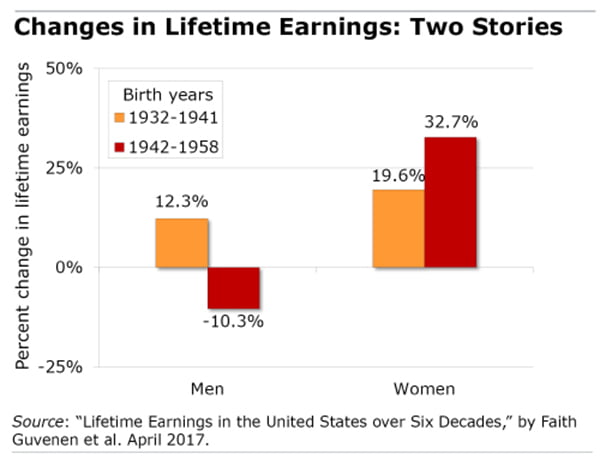
Boomer Men’s Lifetime Earnings Lower
The first study known to look at changes over several decades in lifetime earnings for the nation’s workers shows a dramatic trend: women are up and men are down.
 The oldest people studied, mostly men, began working in the 1950s, when the post-war U.S. economy was going full throttle, and they started retiring in the 1980s when the industrial economy was only in the early stages of a protracted decline. The youngest workers studied are “middle” baby boomers, who came of age during the twin 1980s recessions in heavy industry and experienced the rise of the service economy and two high-tech booms and busts.
The oldest people studied, mostly men, began working in the 1950s, when the post-war U.S. economy was going full throttle, and they started retiring in the 1980s when the industrial economy was only in the early stages of a protracted decline. The youngest workers studied are “middle” baby boomers, who came of age during the twin 1980s recessions in heavy industry and experienced the rise of the service economy and two high-tech booms and busts.
Over this time period, men’s earnings went through two distinct phases. In the first phase – which spanned the working lives of men born in 1932 through 1941 – the typical man’s lifetime earnings, adjusted for inflation, saw a 12 percent increase, the researchers found.
In the second phase, men’s lifetime earnings turned negative. Boomers born in 1958 have earned 10 percent less in total than men born in 1942. The decline is primarily due to men being paid less after accounting for inflation, and not from reductions in how many hours or how many years they worked, the analysis found.
In contrast, lifetime earnings for women born over the same 27-year period enjoyed “steady” and “broad-based” gains of 20 percent and 30 percent over the two sub-periods.
The big beneficiaries were middle-boomers, who joined the vanguard of women pouring into the labor force. Their lifetime earnings were higher than previous generations of women, because boomer women worked more. Today, women make up half of all U.S. workers. But boomer women’s earnings also increased because they devoted more time and effort to college and careers, which increased their earnings potential.
Over this time period, it’s also true that employer spending on workers’ health and retirement benefits was increasing, the researchers said. Adding the value of these benefits to male workers’ compensation improves the picture but “does not overturn the conclusions” that men’s lifetime earnings have declined.
To read the study, click here.
Squared Away writer Kim Blanton invites you to follow us on Twitter @SquaredAwayBC. To stay current on our blog, please join our free email list. You’ll receive just one email each week – with links to the two new posts for that week – when you sign up here.
Comments are closed.







However, the gains for women were just catch up due to previously lower educational attainment and labor force participation and discrimination.
With those factors no longer relevant, average pay for women is now falling too, and has been for some time..
https://larrylittlefield.files.wordpress.com/2016/10/chart-5.jpg
Yes, but women have done far better in the current generation compared to their moms, 44% of whom were home bodies. See this research summary.